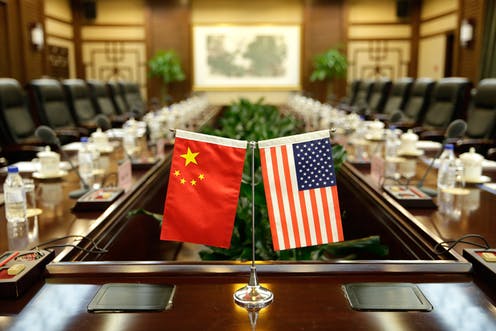Picture the US-China trade spat as a boxing match (Donald Trump probably has). The US is the slugger – the pulverising champion – and China is the fast-rising challenger. A bit like George Foreman against Muhammad Ali in the Rumble in the Jungle. The champion slugger both can and must land a knockout punch early – because he hasn’t trained to go the distance. If he doesn’t, he’s in trouble.
The early rounds appear to be going Trump’s way. Reports from Beijing suggest the Chinese leadership was caught off guard by the intensity of Trump’s early assault. As if expecting him to jab gently to probe their defences, they were rocked on their heels by the ferocity of the barrage: some US$200 billion of tariffs on Chinese imports, with more where that came from.
Although China emerged from the 2008 global financial crisis in better shape than most countries, thanks to a US$4 trillion stimulus programme, the resulting investment boom sent China’s gross debt soaring. Worse, much of the investment yielded low returns, making some debt difficult to service. A severe economic hit now could drive up defaults, possibly inducing a financial crisis. China is vulnerable.
In contrast, the US has rarely looked stronger. Real GDP growth recently surpassed 4% while the unemployment rate is below that. And, to further swell his arsenal, the president got Congressional Republicans to cut taxes, pumping another estimated US$1.5 trillion into the US economy over the next decade, with most of the gains expected in the first three years.
In short, the US can withstand almost any punishment that China can mete out in the coming months. Investors are thus betting on the US. Since Trump first announced tariffs, the Chinese currency and stock markets have plunged, whereas America’s bond and stock markets have barely hiccupped. Indicating how painless it’s all felt, Trump told CNBC, “We’re playing with the bank’s money”.
‘The wrong moment’
Were the fight to last beyond a few rounds, however, American stamina would quickly wane. Outside the White House, most economists believe the US is now probably at the peak of its business cycle, and some worry that the tax cuts may actually worsen the downturn when it comes.
Former Fed chairman Ben Bernanke echoed a view widespread among economists that the tax cuts came at “the very wrong moment”. Because fiscal stimulus is generally considered most effective at the opposite end of the business cycle, amid recession, the long-term impact on economic growth may be minimal to nil. The principal effect of the tax cuts may thus be to redistribute some future growth to the present – supercharging the economy today and worsening the recession when it comes. Or, as Bernanke put it, “In 2020, Wile E. Coyote is going to go off the cliff, and he’s going to look down” – the stimulus will run out just as Trump is campaigning for reelection.
It’s as if before leaving the locker room, the champion gorged on candy bars instead of whole grains. He came out swinging, but will be spent by the middle rounds.
Taking the punches
Of course, the Trump administration begs to differ, touting the wage gains and new investment that will result from this influx of new money, thereby permanently raising the economy’s growth rate. That is, of course, possible. But not, on present evidence, likely.
Although it’s still early days, so far the vast majority of the tax cuts have been used by corporations to pad profits and buy back shares. This supports share prices, not to mention any executive compensation packages tied to those share prices. But while a rising stock market creates a wealth effect, and thus stimulates consumption, there’s been little new investment beyond what one would expect at this point in the business cycle.
When the burst of consumption tapers off, there won’t be new output to pick up the slack. Nor, for that matter, will workers be in a position to step up. So far, less than 3% of the tax money has gone towards improving worker compensation, and most of that has taken the form of one-time bonuses. Real wage growth remains sluggish.
As Muhammad Ali knew on that steamy Kinshasa night when he stepped into the ring with George Foreman, title fights are determined less by who can do the most damage as by who is willing to take the most punches. There are suggestions the Chinese leadership is now adopting a long-term view of the trade conflict, interpreting it as a strategic attempt by Washington to thwart China’s rise. Were the Beijing leadership able to find a way to survive the early rounds of this contest, it may be prepared to go the distance.
Donald Trump, on the other hand, may find himself facing voters in the midst of a recession, or at least when the shine is fading from the economy. Who knows? As happened to George Foreman in 1974, he may face his knockout punch well before distance.
 John Rapley’s most recent book is Twilight of the Money Gods: Economics as a Religion and How It all Went Wrong (Simon & Schuster).
John Rapley’s most recent book is Twilight of the Money Gods: Economics as a Religion and How It all Went Wrong (Simon & Schuster).



 India–U.S. Interim Trade Pact Cuts Auto Tariffs but Leaves Tesla Out
India–U.S. Interim Trade Pact Cuts Auto Tariffs but Leaves Tesla Out  U.S. to Begin Paying UN Dues as Financial Crisis Spurs Push for Reforms
U.S. to Begin Paying UN Dues as Financial Crisis Spurs Push for Reforms  Trump Allegedly Sought Airport, Penn Station Renaming in Exchange for Hudson River Tunnel Funding
Trump Allegedly Sought Airport, Penn Station Renaming in Exchange for Hudson River Tunnel Funding  Trump Signs “America First Arms Transfer Strategy” to Prioritize U.S. Weapons Sales
Trump Signs “America First Arms Transfer Strategy” to Prioritize U.S. Weapons Sales  Trump Signs Executive Order Threatening 25% Tariffs on Countries Trading With Iran
Trump Signs Executive Order Threatening 25% Tariffs on Countries Trading With Iran  Nasdaq Proposes Fast-Track Rule to Accelerate Index Inclusion for Major New Listings
Nasdaq Proposes Fast-Track Rule to Accelerate Index Inclusion for Major New Listings  Japan Election 2026: Sanae Takaichi Poised for Landslide Win Despite Record Snowfall
Japan Election 2026: Sanae Takaichi Poised for Landslide Win Despite Record Snowfall  China Warns US Arms Sales to Taiwan Could Disrupt Trump’s Planned Visit
China Warns US Arms Sales to Taiwan Could Disrupt Trump’s Planned Visit  Trump Lifts 25% Tariff on Indian Goods in Strategic U.S.–India Trade and Energy Deal
Trump Lifts 25% Tariff on Indian Goods in Strategic U.S.–India Trade and Energy Deal 
































